|
Printables |
PowerPoints |
Online exercises |
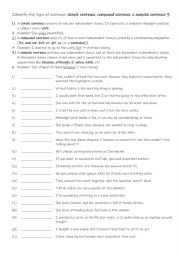
|
A2 Identify the type of sentence simple sentence, compound sentence & complex sentence 3
Students should learn to identify simple, compound, and complex sentences because it helps them write with more variety, organise ideas clearly, understand reading texts more easily, prepare for future learning, and communicate their thoughts more accurately. Each type is used 7 times. Answers on page 2.
Level: elementary
Age: 9-100
Type:
Downloads: 121
|
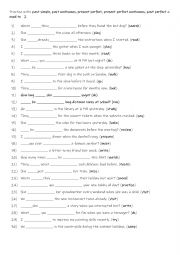
|
perfect, presenA2+-B1 Practise with past simple, past continuous, present t perfect continuous, past perfect & used to 2
Practising these tenses helps students express different aspects of time and actions effectively. The past simple is vital for describing completed actions, while the past continuous sets scenes or shows interruptions in the past. The present perfect connects past actions to the present, and the present perfect continuous highlights ongoing or repe...
Level: intermediate
Age: 9-100
Type:
Downloads: 113
|
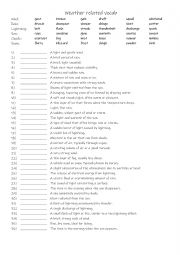
|
A2+-B1 35 weather related words
Students should learn weather-related vocabulary because it improves their ability to describe and discuss weather conditions accurately, which is a common topic in daily conversations and small talk. These words also help students better understand weather forecasts, reports, and natural phenomena, enhancing their listening and reading comprehensi...
Level: intermediate
Age: 10-100
Type:
Downloads: 117
|
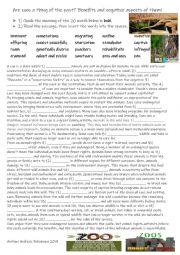
|
Are zoos a thing of the past? Benefits and negative aspects of them!
570-Word reading article with a 20-word gap fill exercise about the advantages and disadvantages of zoos. It takes an in-depth look at both sides of the argument regarding zoos in the 21st century.This sheet is suitable for higher level A2 to B1 students of all ages. An answer sheet is included. For higher level students they could be put in groups...
Level: elementary
Age: 12-100
Type: worksheet
Downloads: 1809
|
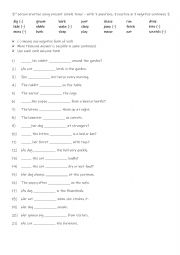
|
3rd person practise using present simple tense � with positive & negative sentences + questions 3
Students familiarise themselves with the 21 verbs. Then they read the sentences to see which question verb is required to complete the gap-fill. Each form is used 7 times! Answers on page 2.
Level: elementary
Age: 8-100
Type:
Downloads: 114
|
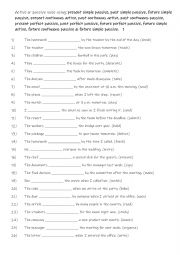
|
B1-B2 Active or passive voice using: present simple passive, past simple passive, future simple passive, present continuous active, past continuous active, past continuous passive, present perfect passive, past perfect passive, future perfect passive, fut
Learning active and passive voice across these tenses enhances students� ability to express ideas flexibly and appropriately. Passive voice focuses on the action or result, especially when the doer is unknown, unimportant, or implied, making it essential for formal contexts like academic writing, journalism, or reports. Active voice, on the other...
Level: intermediate
Age: 10-100
Type:
Downloads: 113
|
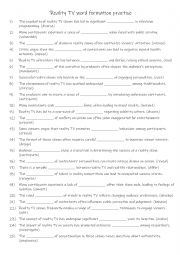
|
B1-B2 Reality TV word formation practise
Understanding word formation allows students to expand their vocabulary, enabling them to express themselves more precisely and creatively. Knowing how to manipulate words helps them create varied sentence structures, making their writing more engaging and dynamic. Mastering word formation is key to achieving higher levels of language proficiency, ...
Level: intermediate
Age: 8-100
Type:
Downloads: 134
|
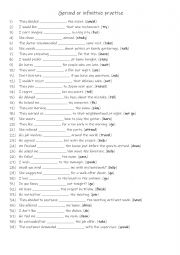
|
B1-B2 Gerund or infinitive practise
Students read the sentences and look at the infinitive in bold to work out if a gerund or infinitive is needed to complete each sentence. Answers on page 2.
Level: intermediate
Age: 10-100
Type:
Downloads: 100
|
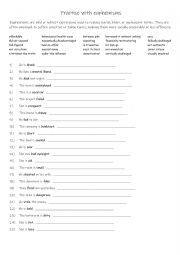
|
B1-B2 Practise with 25 euphemisms
Euphemisms are mild or indirect expressions used to replace harsh, blunt, or unpleasant terms. They are often employed to soften sensitive or taboo topics, making them more socially acceptable or less offensive. First, students need to familiarise themselves with the 25 euphemisms and their meanings. Then they read the sentences to see which one ca...
Level: intermediate
Age: 12-100
Type:
Downloads: 126
|
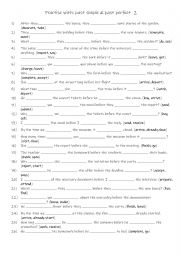
|
A2-B1 Practise with past simple & past perfect 2
First, students need to familiarise themselves with the 2 tenses and their use. Then they read the sentences to see which tense is required to complete the gap-fill using the given infinitive in (). Each tense is used 13 times! Answers on page 2.
Level: intermediate
Age: 9-100
Type:
Downloads: 115
|
|
|
|
|












